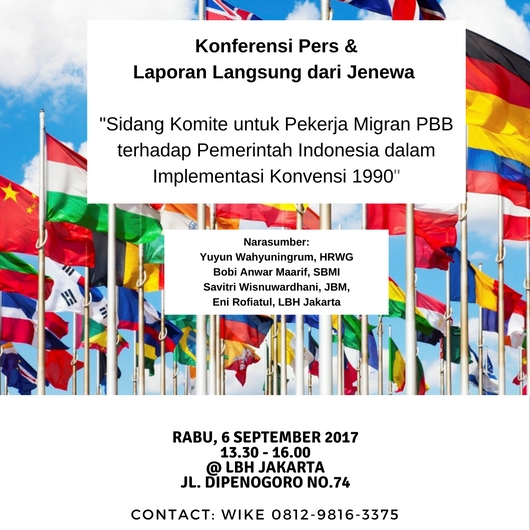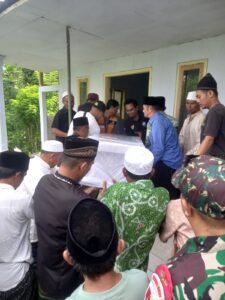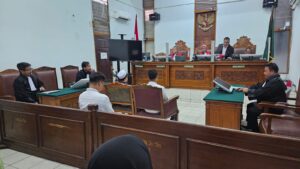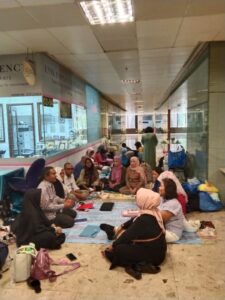A MOMENTUM TO HARMONISE THE LAW ON THE PROTECTION OF MIGRANT WORKERS’ RIGHTS
3 min read
 The Human Rights Working Group (HRWG) would like to suggest the Committee to encourage Government of Indonesia to harmonise its national laws and policies related to the protection of the rights of migrant workers with the UN Convention on the Protection on the Rights Migrant Workers and Members of their Families, including the law on Placement and Protection of Indonesian Overseas Workers (Law No. 39/2004) that is currently under revision process in the Parliament.
The Human Rights Working Group (HRWG) would like to suggest the Committee to encourage Government of Indonesia to harmonise its national laws and policies related to the protection of the rights of migrant workers with the UN Convention on the Protection on the Rights Migrant Workers and Members of their Families, including the law on Placement and Protection of Indonesian Overseas Workers (Law No. 39/2004) that is currently under revision process in the Parliament.
Together with Serikat Buruh Migran Indonesia or Indonesian Migrant Workers Union (SBMI), and Jaringan Buruh Migran or the Network of Migrant Workers (JBM), HRWG has submitted the alternative report to the Committee in last August with the following request for the Committee to question the Government of Indonesia:
- Addressing the current overlapping practice and mandate between the role of Agency for the Placement and Protection of Indonesian Migrant Workers (BNP2TKI) and the Ministry of Manpower.
Proposed questions:
- What kind of measures to be taken by the Indonesian government to minimise the overlapping practices and mandate in the process of revising the Law 39/2004?
- How Indonesian government provides access to justice to migrant workers? Currently, the work of BNP2TKI has not been sufficient to handle the case of migrant workers.
- What can be done to harmonise data both regular and irregular migrant workers between government institutions?
- What is the standard policy related to cost of placement of migrant workers abroad?
- PPTKIS (Private Placement Employers) has been given bigger role in the previous practices in recruitment and placement of migrant workers, which resulted on lacking various protection issues.
Proposed question:
- How PPTKIS will be regulated on the revision of law 39/2004?
- Currently, the training and education for migrant workers mainly has been provided by the agencies (PPTKIS), which has created problems for migrant workers at the destination country, i.e. in-proper capacity of migrant workers.
Proposed question:
- How government to take over the right of education for migrant workers?
- In the implementation of Law No.21/2007 on the Eradication of Trafficking in Persons, government has implemented the national action plans (phase II).
Proposed question:
- How to improve coordination between Coordinating Ministry for Political, Legal, and Security Affairs (Menko Polkam) and Coordinating Ministry for Human Development and Cultural Affairs (Menko PMK)?
- When the MOU between Indonesia and Malaysia will be revised to be compliance with the convention? How has the MoU with Taiwan and Hong Kong been implemented? And how does the Indonesian government explain the placement of migrant workers in a country that does not have an MoU with Indonesia?
- At the moment, Indonesia is not a state party of ILO on Seafarers’ Identity Document Convention:
Proposed questions:
- What is the government’s plan to fill the absence of the law?
- How does government ensure the protection of seafares? (some of seafarers are migrant workers. In Indonesia, the protection of seafarer is under the Ministry of Sea and Fishery o Kementerian Perikanan dan Kelautan, while the right of migrant worker protection is under the Ministry of Manpower).
- Regarding children of migrant workers
Proposed questions:
- How Indonesian government to improve the better protection to the children of migrant workers (regular and irregular) in the destination countries?
- At the domestic level, what will be the efforts of the implementation the decision of Constitutional Court (MK) in regard to obtain a birth certificate?
- What is the coordination mechanism between government agencies for harmonizing protection under the Migrant Workers Convention?
These issues need to be responded by the government in order to ensure its commitment to improve and better protect the rights of migrant workers and member families.


